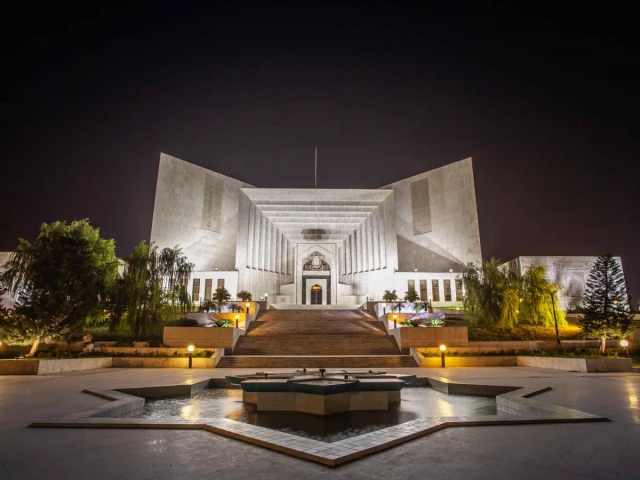The revised code directs judges to maintain impeccable conduct and avoid behavior that raises questions of propriety.
The Supreme Judicial Council has approved amendments to the Code of Conduct for Judges of the Supreme Court and High Court. The amendment prohibits judges from speaking to the media on judicial or political matters and from attending or presiding over public events while in office.
The meeting of the Supreme Judicial Council (SJC) was chaired by the Chief Justice of Pakistan, Justice Yahya Afridi, at the Supreme Court of Pakistan. Justice Syed Mansoor Ali Shah and Justice Munib Akhtar attended the proceedings virtually, while Miss Aalia Neelum, Chief Justice of the Lahore High Court, and Justice Sardar Muhammad Sarfraz Dogar, Chief Justice of the Islamabad High Court, were present in person.
The revised code provides that judges must maintain impeccable behavior and refrain from any conduct likely to raise questions of honesty. “A judge is expected to be above reproach and, to that end, to keep his conduct in all matters, official and private, free from impropriety,” states Article III of the amended code.
The amendments strengthen existing expectations regarding recusal in cases of conflicts of interest. Judges are ordered not to hear cases involving their own interests or those of their close associates. “A judge must resolutely refuse to act in a matter involving his own interests, including those of people he considers and treats as close relatives or close friends. [friends]”, reads Article IV. It further states that “A judge shall strictly refrain from entering into or continuing any commercial relationship, however inconsequential it may be, with any party to any matter before him.”
Importantly, it also prohibits judges from participating in public debate or political debate, particularly through the media. “A judge shall not engage in any public controversy, whether through speech, writing, debate or comment in any forum, much less on political matters, even if those matters involve a question of law.”
The article further states: “He shall not have any interaction with the media, particularly with regard to matters likely to give rise to public debate or undermine institutional collegiality and discipline. »
If public allegations are made against a judge, the code prescribes a formal reporting mechanism. “He may submit the matter in writing before a committee comprising the Chief Justice of Pakistan and four senior judges of the Supreme Court of Pakistan, through its Registrar, for appropriate institutional response.”
Judges are further advised to avoid public comment on judicial or administrative matters. “He will not discuss publicly any judicial or administrative matter, nor will he make public any communication relating to his personal or official affairs. »
Regarding financial conduct, the code warns against involvement in commerce, industry or speculative investments. “A judge should endeavor to avoid, as far as possible, being involved in litigation, whether on his own behalf or on behalf of others. In particular, he should not involve himself in activities such as industry, commerce or speculative transactions, because the pursuit of wealth can never be the objective of a judge.”
He also warns: “Using the influence of one’s position to obtain an unfair advantage, whether immediate or future, constitutes serious misconduct. »
The amendments prevent judges from participating in organizational roles or political activities. Article VII notes: “Extrajudicial duties or responsibilities, whether official or private, shall generally be avoided. He shall also avoid being a candidate for elective office in any organization.”
On the issue of gifts and hospitality, the code provides: “Gifts should only be received from close relatives and close friends, and only those that are customary. Anything that constitutes a favor because of the position should be refused.”
Further, he also added, “A judge of a superior court would not accept an invitation to a dinner/reception held in his honor from an individual member of the Bar.” »
The amended code also emphasizes speedy justice. “A judge shall take all necessary steps to dispose of cases expeditiously, effectively controlling efforts to prevent early disposition of cases and endeavoring to minimize the suffering of litigants by disposing of cases expeditiously through appropriate written judgments. »
To protect judicial independence, Article XV outlines steps for reporting undue influence. “The judge shall forthwith inform, in writing, the Chief Justice of the relevant High Court, the Chief Justice of Pakistan and four most senior judges of the Supreme Court through the respective Registrars.”
In such cases, the matter must be referred to a commission and resolved within a specified period. “The decision of the commission on the report must be taken within fifteen days. »
If the committee does not respond in time, the code imposes escalation. “If the Chief Justice or the committee handling the High Court case, as the case may be, fails to respond within the stipulated time, the Chief Justice of Pakistan and four senior judges of the Supreme Court will take up the matter.”
As part of the meeting, the council also reviewed 74 complaints filed against judges. During the first phase, 67 complaints were examined, of which 65 were rejected, one was deferred and one was approved for further processing by a majority of votes.
Later, due to the disqualification of the Chief Justice of the Islamabad High Court from the issues on the agenda, the council was reconstituted with the inclusion of Justice SM Attique Shah, the Chief Justice of the Peshawar High Court. During this phase, seven additional complaints were examined: five were unanimously rejected, while two were allowed to continue their proceedings.
With the handling of these 74 complaints, the total number of cases handled by the council since October 2024 has reached 155, while 87 complaints remain awaiting initial review.




